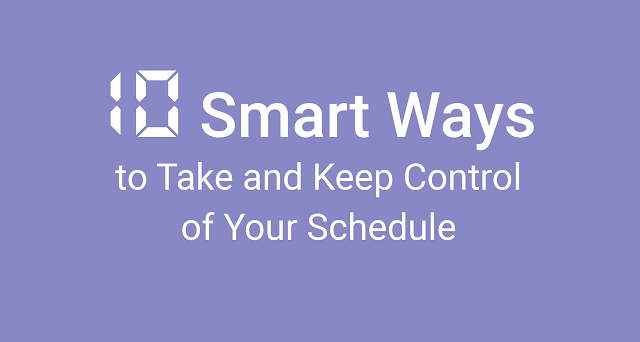Are you In Control of your Business Time and Energy?
There are a lot of things competing for attention these days. Therefore, taking control of your schedule and making time for the things most important to you is essential. Otherwise, you’ll end up letting other people and things dictate how you spend your time, and that can be frustrating and even stressful.
Most people today juggle work, family, social obligations, and everything in between. It can be tough to keep up, and often your schedule gets the best of you at one point or another. When this happens, you feel put out, exhausted, and possibly even worthless and angry.
But you don’t have to live like this. First, you must accept that you are in control of your schedule — if only you take control. There are plenty of smart ways to take control of your schedule, ensuring that you’re making time for the things most important to you. Then, when you do, you’ll be less stressed, more productive, have more free time, and even improve your health, all while experiencing better work-life balance and higher productivity.
Here are ten smart ways to take and keep control of your schedule:
#1. Keep a Daily Planner and Update it Regularly.
A daily planner can help you keep track of your commitments and ensure that you make the time for what is truly important to you. It’s easy to feel like you’re always on the go, never having enough time. But, with a small amount of organization and planning, you can take control of your schedule and create a more balanced life.
A daily planner can help track your appointments, to-do items, and goals. It is an effective way to reflect on your day and see where you can make improvements.
To make a planner work for you, you’ll want to:
- Choose the right planner for you.
- Set aside daily time for updating your planner.
- Use your planner to track more than just appointments.
- Review your planner regularly.
With thought and planning, you can make the most of your daily planner and use it to create a more balanced life. But as you see, it’s imperative that you put everything into your planner and not just work stuff. It is best to schedule the most important things first to ensure your life is heading in the direction you want.
#2. Set Aside Specific Times for Specific Tasks
When you focus on specific tasks during set periods of time, it can help your workflow more smoothly and avoid double-booking yourself. This method is especially effective when you have upcoming deadlines.
By setting a timer, you can ensure that you give each task the attention it deserves. And if you find that you often run out of time, this can help you to be more mindful of how long each task takes so that you can plan your day accordingly.
If your business is considered a full-time job, and you are taking care of your family, and want to make time for yourself, you can set aside specific times for each of these tasks. For example, you can work from 9 am to 5 pm, spend time with your family from 6 pm to 8 pm, and then have some time for yourself from 9 pm to 10 pm.
Of course, this schedule will look different for everyone. But it’s vital to be deliberate about making time for each of these things. Setting aside specific times, you can ensure that you’re giving each one the attention it deserves.
There will be times stuff comes up that throws off your schedule. But by setting times for each task, you can always get back on track and ensure that everything gets done even when adjusting the plan. Just pay close attention to how often you need to change. If you need to alter too much, you may not be scheduling your time the best way. But for the most part, if you always load the dishwasher and clean the kitchen as you go using a system, every task will feel much more manageable.
#3. List Your Priorities and Stick to Them
One way to have a better work-life balance is to list your priorities and stick to them. This seems easy, but it can be complicated when you have a lot to do. However, taking the time to figure out what is most important to you will help you avoid getting sidetracked by less important tasks.
Be sure to review and update your list regularly to reflect your current priorities accurately. This will help you stay focused on what is most important to you and help you achieve a better work-life balance.
For example, if you are a parent who is trying to achieve a better work-life balance, you may have prioritized your time as follows:
- Work
- Family
- Personal time
- Hobbies/Interests
You can re-evaluate your priorities if you consistently work late and miss family dinners or important events. Ensure to spend enough time on each of your priorities and adjust accordingly. You don’t have to work all the time and miss out on time with your family, friends, or yourself.
Sticking to a list of priorities is challenging but trying to achieve a better work-life balance is crucial. When you review and update your list regularly, you will ensure that you stay on track and make the most of your time.
#4. Don’t Procrastinate
Putting the stuff, you need to do off until the last minute is stressful and produces subpar results. However, it’s essential to try and complete tasks as soon as possible so you can move on to other things. Sometimes it can be helpful to understand why you’re procrastinating. Maybe you need to outsource that task instead of doing it yourself.
Maybe you need more education about that task to do it better. The main thing is, if you put the task in your schedule, you should try to do it on schedule regardless of how you feel at the time.
Procrastination can be a difficult habit to break, but it’s worth it in the long run. When you learn to overcome procrastination, you’ll be able to get more done and feel less stressed. Remember, motivation comes after action, not before.
I offer a simple, Free, 7 Day ‘Defeating Procrastination Series Challenge”
#5. Delegate Tasks Whenever Possible
You really can’t and shouldn’t do everything. However, it’s vital to delegate tasks whenever possible. Delegating allows you to get more done in less time and ensures that you build stronger relationships with the people you want to be around most. But be sure you understand the abilities of the person to whom you delegate.
Here are some tips on delegating to others:
- Be clear about what you need to be done. The person you’re delegating to should know exactly what is expected of them.
- Choose the right person for the task. Delegate to people who can do the tasks best and have the time to do them.
- Let go of the need to control it all. It’s okay to delegate tasks and then let go of the need to control every aspect of them.
- Follow up as needed. Check in with the person you delegated to from time to time, but don’t micromanage.
Delegating can be a great way to get more done and build better relationships with the people around you. Just remember to be clear about what needs to be done and to choose the right person for the task. And then let go of the need to control everything and follow up as needed.
#6. Take Advantage of Technology
Technology can be a great time-saving tool if used correctly. For example, setting up automated reminders or using a task management app can help you keep track of your commitments and ensure that you are completing them in a timely manner.
However, the challenge is knowing where to start with so many options available. Here are some ideas for busy parents who want to take and maintain control of their schedule to have a happier, more balanced life.
- Set up automated reminders for important tasks – Try Google Calendar or Todoist.com.
- Use a task management app to track your to-do list – Try Asana.com, Trello.com, or Todoist.com.
- Take advantage of technology to save time on mundane tasks – Try IFTT.com or Zapier.com.
- Make use of productivity tools to help you get more done in less time – Try RescueTime.com.
- Keep your devices organized and tidy – Unclutter your desk and delete information when you’re done.
Technology can significantly assist your quest for a happier, more balanced life. By taking advantage of some of the time-saving tools available, you can free up your time to focus on everything truly important to you. Try different technology that can do the above to determine which software or automation works best for your needs.
#7. Avoid Multitasking
Most people are guilty of trying to multitask at one point or another. Whether trying to finish up a work project while also catching up on your favorite TV show or answer a friend’s text while you’re in the middle of cooking dinner, falling into the trap of thinking you can handle more than one thing at a time is all too easy.
But the truth is that multitasking is more likely to lead to subpar results and increased stress levels. That’s because when you focus on too many things at once, your brain can’t give any of them your full attention leading to mistakes, missed deadlines, and even accidents.
So how do you avoid falling into the multitasking trap? The best solution is to focus on one task at a time whenever possible. This will help you give your full attention to the task at hand and ultimately help you get better results.
Of course, there are times when multitasking is unavoidable. For example, if you’re a parent, you might have to help your child with homework while also fixing dinner. In these cases, it’s essential to be as organized as possible. Make a list of the tasks you need to complete, and then tackle them one at a time.
You can also teach your kids the importance of focusing on one task at a time. For example, when doing their homework, they turn off the TV and put away their phone, so their full attention is on their mission.
By avoiding multitasking whenever possible and teaching your kids to do the same, you can help them (and yourself) become more productive and less stressed.
#8. Take Breaks
Did you know that sleeping resets and organizes your brain? When you’re sleep-deprived, your prefrontal cortex—the area of your brain responsible for higher-level thinking, such as planning and decision-making—doesn’t work either. As a result, sleep deprivation leads to poor decision-making, reduced productivity, and increased stress.
Do you know that feeling of being overwhelmed by work? You always think there’s too much to do and not enough time. When that happens, it’s natural for your mind to start racing, preventing you from focusing on anything.
Regular breaks ensure that you stay refreshed and focused throughout the day. When taking a break, be sure to step away from your work area so that you can fully relax and rejuvenate.
Taking a break allows your mind to take a break from all the stress and work tension. The break gives you a chance to relax and rejuvenate so that you can be more focused when you return to work. Schedule breaks before you feel overwhelmed by work, and you’ll increase your productivity exponentially.
#9. Simplify Your Life
Modern life can be hectic. You are juggling work, family, and social obligations and trying to find time for yourself too. So it’s no wonder many folks feel stressed out and overwhelmed.
To reduce stress and get more control over your life, you need to simplify. Simplifying your schedule means eliminating unnecessary tasks and commitments and streamlining your schedule.
For example, if you’re always rushing around trying to get everything done, see if there are any activities you can cut out of your schedule. For example, maybe you don’t need to go to that weekly happy hour or volunteer for that committee. Or perhaps you can hire someone to do some of your chores, like laundry or grocery shopping.
Simplifying your life can also mean letting go of material possessions. If you’re constantly tripping over clutter in your home, it’s time to eliminate some of it. Have a garage sale, donate to charity, or just throw out anything you don’t use or need.
Streamlining your life will give you more time and energy for the truly important things. So don’t be afraid to downsize and declutter. Start wearing all black or anything else that makes your daily schedule more controllable. Streamlining and simplifying your life might be the best thing to do.
#10. Say No
It’s easy to feel like you’re constantly being pulled in multiple directions. There are always more requests and demands placed on your time than you can accommodate. Learning to say no is vital in taking control of your schedule and avoiding burnout.
Saying no doesn’t mean you’re being selfish or uncooperative. It simply means that you’re setting boundaries and priorities. You must learn to be selective about what you take on to focus on the things that are truly important to you.
Try these tips to help you say no easier:
- Be assertive. Don’t hesitate or make excuses. Just politely and firmly decline.
- Be direct. It’s okay to be blunt if you need to. There’s no need to beat around the bush.
- Be specific. If you’re comfortable doing so, explain why you’re saying no. This can help the other person understand and respect your decision.
- Offer an alternative. If you cannot do something yourself, see if there’s someone else who can help.
- Be prepared for resistance. The other person may not be happy with your decision, but don’t let that sway you. Instead, stick to your guns and remain firm in your resolve.
Learning to say no is essential in controlling your time and life. By setting boundaries and priorities, you can make sure that you’re only taking on what you can handle – and focus on the things that are truly important to you so you can get control of your schedule once and for all.
Don’t be afraid to ask for help when managing your time. Plenty of resources exist to help you get started on the path to better time management and control of your schedule. When you’re feeling overwhelmed, reach out and ask for assistance. When you can take control of your schedule, you’ll enjoy your life more and discover a whole new world of productivity that you didn’t know existed.
Getting control of your schedule can seem daunting until you break it down into smaller steps. Breaking anything complicated into smaller steps is much easier to accomplish. Start by examining your weekly schedule to identify areas where you can make changes. Then, start making those changes and see how they impact your stress levels and productivity. You won’t regret it.











